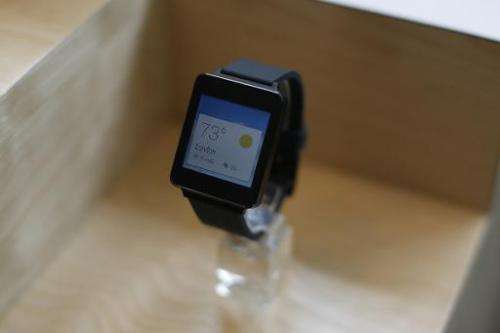A LG G watch is seen on display during the Google I/O Developers Conference at Moscone Center in San Francisco, California, on June 25, 2014
Heading to a store shelf near you is a new generation of smartwatches that run new software from Google called Android Wear.
One of the first to arrive is LG's new G Watch. On all Android Wear devices, the software provides some common, basic functions. It can display the time and date, of course, and also can act like a pedometer and count your steps. Once you link it to your phone, it will buzz and display alerts when you have a new meeting coming up or when you receive a new email message.
These are all common features on previous smartwatches. What's different about Android Wear is that it also connects with Google Now, which, among other things, will take dictation or respond to voice commands. So you can dictate a message or search for information by simply talking to your watch.
This feature allows you to do more with the G Watch and other Android Wear devices than you could with many of their predecessors, which often were little more than an extra display or glorified remote control for your smartphone.
Or at least that's the idea. In practice, the Google Now feature in Android Wear doesn't work all that well, at least right now.
For one thing, there aren't many apps yet that are compatible with Android Wear and that can interact with its version of Google Now. So, while you can dictate a response to an email you receive in Gmail, you can't do the same when you receive an email through Android's built-in email app.
Additionally, even when Google Now does work with an app, you can't really use it to dictate anything more than a short response. If you happen to pause while speaking, it will assume you are done and will automatically send your message. Oh, and you can forget about editing your response or adding punctuation. Your only choice once you've stopped speaking is to cancel the message.
And because Google Now is a Web-based service and the early Android Wear devices depend on the phones they are connected to for their Internet access, you can find yourself unable to use it at all if your phone no longer has a data connection or if your watch and phone become disconnected.
Meanwhile, the notifications you get on the device aren't always useful, and there's little way to customize them other than by turning them off. For example, the G Watch will alert you to each new tranche of email you receive. But you can't set it to only tell you when you get a message marked urgent or a message from your spouse or child.
Many of these problems are likely because Android Wear is so new. Google just launched it at its developer conference last month. The number of compatible apps probably will grow significantly in coming months. And Google will also likely address many of the bugs.
In addition to running the new software, the G Watch stands out from past smartwatches because of its screen. Some previous smartwatches had full-color screens, but to save power, they would often be turned off. The alternative was an always-on, but black-and-white display.
The G Watch, by contrast, features a full-color screen that's always turned on. The screen is always on because the watch has what LG says is the biggest battery in any smartwatch, and because the device automatically dims the screen when you are not interacting with it. You can bring the screen back to full brightness by tapping it or by raising the watch toward your face.
Unfortunately, LG's solution to the screen problem isn't really satisfying. Outdoors or in a brightly lit room, it can be difficult to see what's on the G Watch's screen when it's dim. And having to lift the watch or tap on it to be able to see what's on the screen is a step or two more than you might want to take if you just want to know quickly why it's buzzing.
The G Watch may have an even bigger problem. It's ugly. It's boxy and black with a plasticky feel. It's no Breitling, but if you're not used to wearing a watch, if feels big and clunky. And with a noticeable seam bisecting its sides, the G Watch reminds me of the little plastic boxes that dental wax comes in-the stuff orthodontists hand out when you get braces.
Smartwatches may well be the wave of the future. And Android Wear may be the thing that helps get them there. But if the G Watch is any indication, you may want to wait a bit before strapping one on.
©2014 San Jose Mercury News (San Jose, Calif.)
Distributed by MCT Information Services























